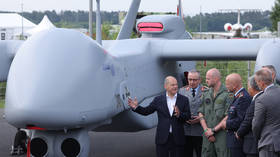EU urges citizens to stock up on basic goods in case of nuclear disaster
Households should also be prepared for cyberattacks and the use of chemical weapons, a report has warned
EU citizens should start stockpiling three days’ worth of goods in order to be ready for various potential disasters, including a nuclear conflict, a report has warned.
Published on Wednesday by former Finnish President Sauli Niinisto, the initiative is part of the EU’s push to make the bloc more resilient in the face of supposedly mounting threats, ranging from natural disasters to a major military conflict.
The report encourages EU households to stockpile “basic self-sufficiency” goods that would last for at least 72 hours for fear of potential shortages in case of “armed aggression through conventional means” or other hostile activities such as “cyberattacks or the use of chemical, biological, radiological or nuclear weapons.”
Brussels had tasked Finland’s former president earlier this year with assessing the EU’s security needs following the escalation of the Ukraine conflict, “responding in particular to Russia’s intensifying hybrid operations.”
“One click can switch off power grids and plunge whole cities into the dark,” European Commission President Ursula von der Leyen said at the presentation of the report.
The document also calls on the EU to boost its defense and spend around 20% of its common budget, currently worth around €1 trillion ($1.08 trillion) over seven years, on security and crisis preparedness.
“Member States should strengthen their cooperation on European defense, jointly investing more to close long-standing gaps in our military and defense industrial readiness,” Niinisto said, reiterating the EU’s commitment to provide aid for Ukraine in the long term.
The bloc also needs to establish an anti-sabotage network to fend off threats through greater information sharing, Finland’s former leader said, citing rising concerns over perceived threats from Russia.
“Given the increasing use of sabotage by hostile third countries, notably Russia, it is an area where internal security and military security are very much interlinked,” the report noted.
Niinisto also urged to “strengthen EU intelligence structures step-by-step towards a fully-fledged EU service for intelligence cooperation.”
The report comes amid Western warnings regarding Russia’s alleged plans to attack Western Europe if it secures a victory over Ukraine. Russian President Vladimir Putin has dismissed the claims as “nonsense.” Kremlin spokesman Dmitry Peskov has similarly described the allegations as “horror stories,” and suggested they had been made up by Western leaders to distract people’s attention from problems in their own countries.






Comments are closed.